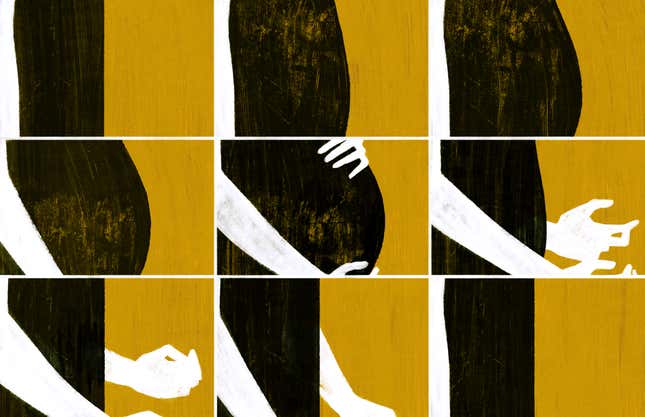
Image: Angelica Alzona/GMG
I recently met someone new and we talked for a while. She asked me where I’m from; I asked her what she does for work. She asked me if I have any children.
That last question gave me pause, not because it was too personal but because I wasn’t sure how to answer. If I said no, it would feel like a sad lie. If I said yes, she might ask how old my child is and I would have to say, “He would have been one in March.” Then she might say, “Oh. I’m so sorry,” and we would sit together in a sea of awkwardness rising around us. Maybe she would stop there, or continue with a sympathetic “May I ask what happened?” And I would have to say, “He died.”
But that would be a half-truth.
If I were being honest, I would string together a series of words so ugly I never thought they could be real: “I ended his life.”
I paused for a moment and said, “No children. You?”
I have been thinking a lot about when parenthood begins. We have heated debates in our public discourse about when life begins, especially now, as an emboldened anti-abortion movement tries to build a case against reproductive rights. But the question of when parenthood begins has been on my mind as I read the headlines: “Uproar in Virginia Over Late-Term Abortion,” “New York Codifies Abortion on Anniversary of Roe vs. Wade.”
For me, parenthood began 21 weeks and two days into my pregnancy. It was pouring outside as I rode to the hospital for my mid-pregnancy ultrasound. This was the big one, friends told me, the one where you finally get to see your child: his face and all of those small fingers and toes. The technician made small talk as she glided the wand across my protruding belly. My husband Josh and I marveled at the tiny, flawless-looking human who came into focus on the screen. Josh cracked a joke: small butt, just like his parents.
For me, parenthood began 21 weeks and two days into my pregnancy. It was pouring outside as I rode to the hospital for my mid-pregnancy ultrasound
Everything seemed routine. The technician finished up and left the room. The soundtrack of our baby’s heartbeat played an upbeat tempo in the background. A few minutes went by and the technician came back, letting us know she would take a few more pictures of his head for a clearer look. That sounded reasonable. She left again, this time for longer, and when she returned a doctor wearing a white lab coat walked in behind her looking very serious and shut the door.
-

-

-

-

-

-

-

-

-

-

-

-

-

-

-

-

-

-

-

-

-

-

-

-

-

-

-

-

-

-

-

-

-

-

-

-

-

-

-

-








































